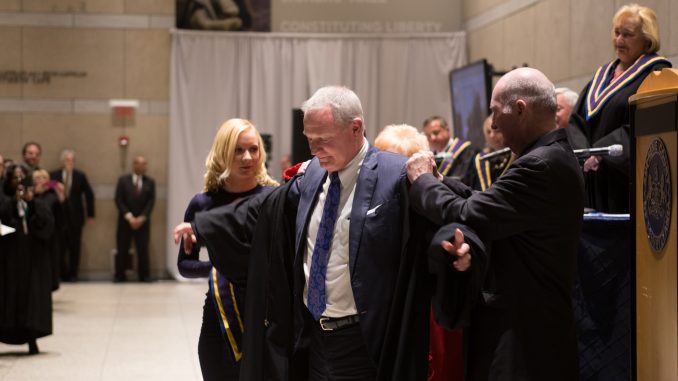
“How about the view?” Justice Kevin Dougherty said as he looked out over City Hall, the Ben Franklin Bridge and the Delaware River from the wall of windows in his 41st-floor office in Center City.
The small window in his former office in City Hall faced a 7-Eleven.
Dougherty, a 1985 political science alumnus, was the first person in his family to attend college. He commuted to Temple from South Philadelphia and worked several part-time jobs to pay for school and subway fares.
On Jan. 5, he was sworn in to the Supreme Court of Pennsylvania after serving as a judge for the Court of Common Pleas in Philadelphia from 2001 to 2015. One year later, Dougherty talked to The Temple News about the first year of his 10-year term.
“It all started as a result of paying that fare, getting on that subway and getting off at Columbia Avenue,” he said, referring to Cecil B. Moore Avenue, which was renamed in 1987.
Dougherty was the administrative judge of the Philadelphia Family Court Juvenile Division from 2005-14, which processes cases involving minors accused of committing crimes, neglect and abuse allegations, truancy petitions and adoptions. There, he was known for being tough on minors who committed crimes, but dedicated to helping them find help.

“It’s so easy for us to look at people through the eyes of how we were raised,” he said. “But the fact that I’m sitting here and that you’re sitting here means that something went right in our lives. And there’s a lot of people that don’t have that rightness.”
Dougherty is the former co-chair of the Philadelphia Youth Violence Prevention Collaborative, which was created when Philadelphia received a grant to participate in the National Forum on Youth Violence Prevention, an interdisciplinary effort to reduce youth violence in cities around the country.
Caterina Roman, a criminal justice professor with more than 25 years of experience working on youth violence policy, was Dougherty’s research partner during the two-year project.
“He’s a very strong leader,” she said. “When he was the head of the family court, he was very much a big supporter of any type of alternative sentencing. He was always looking for innovative ways to keep youth out of the criminal justice system.”
“In theory, juvenile justice systems should be restorative and focus on rehabilitation,” she added. “[He wanted] to keep kids out of being labeled delinquents.”
Dougherty still considers himself social justice-oriented. He attended the Antioch School of Law in Washington, D.C., now known as University of the District of Columbia David A. Clarke School of Law.
“My reality was to pursue public interest law,” he said. “How can I use the skills that I’ve acquired to make life better for somebody that has it less than I? … What direction am I walking? The path of business and Wall Street? Or do I continue walking the path of North Philadelphia helping the homeless and the most-risk and vulnerable families?”
“I haven’t gone too far,” he added. “As we often say in our family, one way that we won’t forget where we came from is that we never leave.”
Dougherty said it was a challenge switching from affecting individuals’ lives in the trial court to affecting the whole state with his decisions. He said the new role taught him “you never get tired of learning.”
He and his colleagues each review approximately 300 requests for appeal per year. They read through the files and write a justification for whether the Supreme Court should hear the case. He is also responsible for reviewing the other justices’ decisions, various administrative duties and travelling around the state when the Supreme Court is in session six times per year.
Next week, he will hear 23 cases in Harrisburg.
Shane Carey worked on Dougherty’s campaign and later became his administrative aide. Carey started working for the court the same day as Dougherty and said he has seen him grow this year.
“I would say by May is when I really saw [Dougherty] feeling really, really confident and assertive in what he was doing,” he said. “That learning curve that they said was going to take two or three years, I would say he mastered in five months.”
His personal goal for the remaining nine years of his term, however, is to advance specialty courts. In particular, he wants to expand veteran’s courts and educate the judiciary about young veterans’ mental health and employment needs.
“My history in family court has always been to fight for the at-risk, the vulnerable and the underdog,” he said. “Well these guys and gals fought for us. Isn’t it about time we start fighting for them at home?”
“If you’re going to enter the law, you have to remember the law affects everyone,” he added. “It touches every race, creed, orientation, you name it. There’s not an individual in Pennsylvania that will not somehow feel the effect of a decision I and my colleagues make.”
Erin Moran can be reached at erin.moran@temple.edu or on Twitter @ernmrntweets.


Be the first to comment